Tag: philosophy
Martin Panelius & Risto Santti & Jarkko S. Tuusvuori: Käsikirja [The hand book]
8 May 2014 | Mini reviews, Reviews
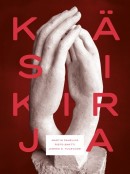 Käsikirja
Käsikirja
[Handbook]
Helsinki: Teos, 2013. 761 pp., ill .
ISBN 978-951-851-523-7
€37, hardback
Human development and human life are in many ways linked to the hand – and yet we seldom think about its significance. In their accessibly written and comprehensive Käsikirja, Emeritus Professors Martin Panelius and Risto Santti are joined by researcher Jarkko S. Tuusvuori in considering the body’s upper extremity from various points of view. The authors’ expertise in their own fields – neurology, anatomy and philosophy – set the book’s tone, but it goes far beyond these. The structure and functions of the hand are examined, as are its phylogeny, its neural networks, its aging process, its use in skills, and the injuries and illnesses that threaten it. The book deals with the hand’s connection with language and communication, its social significance, and the importance of human touch. There are a great many details, terms and names, but the artwork, the beautiful layout, the examples and the literary selections enliven the narrative. A multi-faceted achievement, Käsikirja is a refreshingly original work of non-fiction.
Translated by David McDuff
Tarmo Kunnas: Fasismin lumous. Eurooppalainen älymystö Mussolinin ja Hitlerin politiikan tukijana [The allure of fascism. European intellectuals as backers of the policies of Mussolini and Hitler]
13 March 2014 | Mini reviews, Reviews
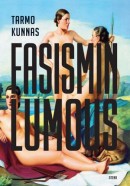 Fasismin lumous. Eurooppalainen älymystö Mussolinin ja Hitlerin politiikan tukijana
Fasismin lumous. Eurooppalainen älymystö Mussolinin ja Hitlerin politiikan tukijana
[The allure of fascism. European intellectuals as backers of the policies of Mussolini and Hitler]
Jyväskylä: Atena , 2013. 686 pp .
ISBN 978-951-796-933-8
€40, hardback
The most prominent fascist states in the period between the world wars were Nazi Germany and Mussolini’s Italy, but the ideology was reflected in the extremist movements of a number of European countries. The fascist movements could differ greatly, but their key feature was a strong nationalism that was both anti-democratic and anti-parliamentary. In his book, which at times is rather heavy going, Emeritus Professor Tarmo Kunnas examines the attraction of Fascist ideology for the European intelligentsia of the 1920s, 30s and 40s. He presents a nuanced view of the opinions of the period’s major intellectuals and detects the sources of their world outlook in factors like their philosophy of life. Their fascism rarely fitted in with party political programmes. Kunnas also sheds light on the fascist views of some of Finland’s cultural figures; according to him, in Finland genuine fascist groups did not really have much significance.
Translated by David McDuff
Is this all?
10 October 2013 | Extracts, Non-fiction
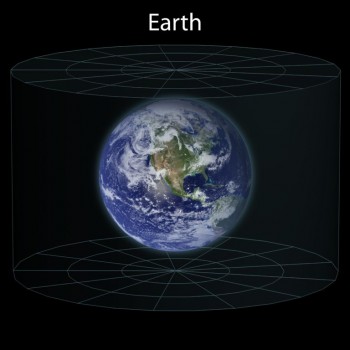
Earth. Andrew Z. Colvin/Wikimedia
In today’s world, many people find that it is not the lack of something that is problematic, but excess: the same goes for knowledge. According to professor of space astronomy, Esko Valtaoja, knowledge should contribute to the creation of a better world. His latest book is a contribution to the sum of all knowledge; over the course of two hundred pages Valtaoja delves deep into the inner space of man by taking his reader on a brief tour of the universe. Extracts from Kaiken käsikirja. Mitä jokaisen tulisi tietää (‘A handbook to everything. What everybody should know’, Ursa, 2012)
Whatever god you bow down to, you’re probably worshipping the wrong god.
The above is almost the only completely certain thing that can be said about religion, and even it does not encompass any deep truth; it’s just a simple mathematical statement. The world’s biggest religion is Roman Catholicism, which is confessed, at least nominally, by 1.1 billion people. If the Roman Catholic god were the true god, the majority of people in the world are therefore worshipping a false god. (According to the official stance of the Catholic church, the other Christian denominations are heresies, and their believers will be condemned to perdition: extra ecclesiam nulla salus. This inconvenient truth is, understandably, politely bypassed in ecumenical debate. But even if all those who call themselves Christians were counted as worshipping the same god, two thirds of the world’s population are still knocking at the wrong door.)
If you’re a religious person, don’t worry; I’m not blaspheming. And if you’re a campaigning atheist, hang on a minute: all I want to do is to find a clear and undisputed starting point to consider what it is we’re talking about when we speak of religion. More…
Elitist versus pop?
8 August 2013 | Letter from the Editors
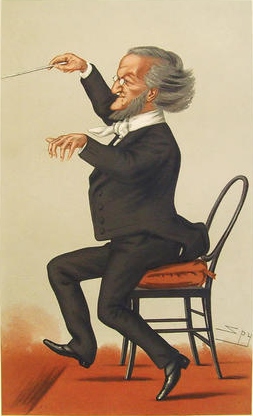
An elitist of his time? A caricature of Richard Wagner by Leslie Ward, published in Vanity Fair in 1877 (caption read ‘The Music of the Future’). Picture: Wikimedia
The old phrase ‘art for art’s sake’ has begun to sound like an appeal instead of an bohemian creed, without any negative ambiguity. Please let art be created for art’s sake!
In our times of neo-liberal ideologies, the criteria for assessing art include its capacity to generate profits to creative industries, to have export value, to be of assistance to business in general. But art, in essence, serves no ideology.
Technology now allows us to be more entertained than ever before, if we so choose. Art and entertainment alike come to us by the use of various devices. What has often been called ‘elitist’ art – opera, modern music, ballet – can be enjoyed lying on the sofa in the home. Money is not an obstacle.
Art, too needs money, of course: orchestras, theatres, training of artists and artists themselves need subsidies from society. Entertainment is by nature profitable business, as it attracts and involves large paying audiences. Smaller audiences want to listen to classical music, read books and see films that are not made solely in order to bring in as much money as possible. But why should these forms of art be called ‘elitist’? More…
Writing silence
6 June 2013 | Fiction, poetry, Reviews
In contemporary poetry the ‘lyric I’ of previous decades often hides behind language; the poem’s speaker is not the poet him/herself, narrative is not the norm. The website of a Finnish family magazine in 2007 discussed this: ‘OMG, this thing called contemporary poetry – crap!’; ‘Who knows what kind of psychopharma the writer’s on!’; ‘No meanings, just words one after the other. Why can’t people write something sensible?’ But the writer – and the reader – of contemporary poetry deliberately ventures onto the boundaries of language, and art requires readers (listeners, viewers) to make the decision of what they consider ‘sensible’. Mervi Kantokorpi explores and interprets two new collections of poetry
I read two of this spring’s new collections of poetry one after the other: Kivirivit (‘Stone lines’, Otava 2013) by Harry Salmenniemi and Pysty hiljaisuus (‘Vertical silence’, Teos 2013) by Miia Toivio. The experience was perplexing.
These two works are completely different from one another as regards their individual poetics, and yet the similarities between the themes that arise from them was arresting. Both works seem to inhabit an internal world of sorrow and depression, a world where the function of poetry is to forge and show its readers a path out of the anxiety. In their silence – and even emptiness – both collections have two faces: one lit up, the other darkened by grief. More…
In one hundred springtimes
23 November 2012 | Extracts, Non-fiction
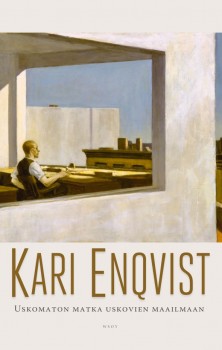 Extracts from Uskomaton matka uskovien maailmaan (‘An unbelievable journey into the world of the believers’, WSOY, 2012)
Extracts from Uskomaton matka uskovien maailmaan (‘An unbelievable journey into the world of the believers’, WSOY, 2012)
In his new book the writer, professor of cosmology, a scientist without a religion Kari Enqvist explores religiosity, how it manifests itself in present-day Finland, in various churches and parishes. How will the expanding scope of science and secularisation change the world and the forms of spirituality in the course of the next century?
When, in July 1969, Neil Armstrong climbed down the ladder on to the surface of the Moon, it was a huge propaganda coup for both the United States and the scientific world view. Manned space flights as a way of gaining knowledge are both ineffective and brain-numbingly expensive, but it is hard to imagine a stronger individual and universally understandable demonstration of the superiority of the scientific world view than an astronaut on the surface of a foreign celestial body. Everyone can recognise it as a triumph of both engineering technology and the hard sciences.
But the astronaut solution has been tested already, and I do not believe that space travel will expand our consciousnesses in the next century. It is possible that we will not even have visited Mars. Fantasies about manned flights to other stars are, in my opinion, utopian in the extreme and I do not really believe that humans as physical beings will ever leave the solar system. Journeys to the stars are inconceivably long and so expensive that they cannot be embarked on merely in order to fulfil the Buck Rogers fantasies of teenage boys. Carrying humans to the closest one, alpha Centauri, a mere four light years away, would take, at best, hundreds of years (we can dismiss rockets that travel at the speed of light as mere scientific fantasy). Even if deep-freezing to slow vital functions were possible, it would make as much sense to pay hundreds of billions to freight pig carcasses to the planets. For everything that human beings can do can be done better – and, more importantly, more cheaply – by machines. Even if the spirit were willing, the flesh is so weak that silicone beats it hollow.
So it is my guess that in place of the macrocosmos the scientific world view will seek consolidation in the microcosmos. As a cosmologist, I am not happy to admit this, but admit it I must. More…
Tero Tähtinen: Katmandun unet. Kirjoituksia idästä ja lännestä [Kathmandu dreams. Writings about East and West]
26 January 2012 | Mini reviews, Reviews
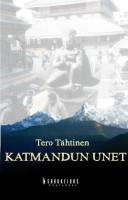 Katmandun unet. Kirjoituksia idästä ja lännestä
Katmandun unet. Kirjoituksia idästä ja lännestä
[Kathmandu dreams. Writings about East and West]
Turku: Savukeidas, 2011. 332 p.
ISBN 978-952-268-005-1
€ 19.90, paperback
Tero Tähtinen’s second collection of essays is focused physically in the wilds of a Finnish national park and Nepal – where the author (born 1978), a literary scholar and critic, has frequently travelled – and mentally in the divergences of Western and Eastern thought, which Tähtinen, who is familiar with Zen and Buddhist philosophy, studies, occasionally by means of literary examples. The ‘Socratic ego’ of the Western egocentric, individual ‘I’, which strives in vain to understand the whole of reality by rationalising it, is his favourite bête noire. Tähtinen quickens the pace of his verbal virtuosity as he discusses both dogmatic, materialistic faith in science – as well as some of its representatives – and Christian faith: he considers that both, in their pursuit of an absolute and total explanation, end up in a metaphysical vacuum. Unlike them, Eastern philosophy, in which the individual ‘I’ is not the centre and measure of all things, does not give rise to the anxiety of compulsive cognition. The virtual narcissism of Facebook, a platform tailor-made for the Socratic ego, receives Tähtinen’s outright condemnation: ‘Facebook trivialises humanity,’ he declares. At the end of these passionate essays on the author praises silence.
Translated by David McDuff
Round and round
2 December 2011 | Essays, Non-fiction
In this essay, Olli Löytty imagines himself in a revolving door that is able to spin his old family home and its inhabitants backwards in time – as far as prehistory. In addition to his own family’s past, Löytty zooms back into the history of the world’s great changes, for a moment playing the part of a cosmic god examining our globe
An essay from Kulttuurin sekakäyttäjät (‘Culture-users’, Teos, 2011)
If a film camera had stood outside my home from the time when it was built, I would rewind the movie it made from the end to the beginning. The story would begin with my children, one autumn morning in 2011, walking backwards home from school. The speed of the rewind would be so fast that they would quickly grow smaller; I, too, would get thinner and start smoking. I would curiously seek out the point where my wife and I are seen together for the last time, stepping out of the front door, back first, and setting out on our own paths, to live our own separate young lives.
At that time my grandmother still lives in the house with her two daughters and their husbands, and lodgers upstairs. The next time I would slow the rewind would be the point where, at the age of 18, finally move out of the house. The freeze-frame reveals a strange figure: almost like me, but not quite. In the face of the lanky youth I seek my own children’s features.
When I let the film continue its backwards story, I seek glimpses of myself as a child. Even though we lived in distant Savo [in eastern Finland], we went to see my grandmother in the city of Tampere relatively often. We called her our Pispala grandmother, although her house was located to the west of the suburb limit, in Hyhky. I follow the arrival of my grown-up cousins, their transformation into children, the juvenation of my grandmother and her daughters, the changing lodgers. At some point the film becomes black-and-white. More…
Juha Sihvola: Maailmankansalaisen uskonto [The religion of the world citizen]
21 October 2011 | Mini reviews, Reviews
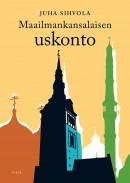 Maailmankansalaisen uskonto
Maailmankansalaisen uskonto
[The religion of the world citizen]
Helsinki: Otava, 2011. 199 p., ill.
ISBN 978-951-1-21279-9
€ 29, paperback
This book focuses on the core questions of religious philosophy with special emphasis on Christianity, but it also addresses Judaism, Islam and the Middle East conflict as well as conflicts between Hindu nationalists and Muslims. Juha Sihvola, a professor of history, ends up advocating the view which holds that religion and science are largely independent of one another: under-standing the special nature of belief enables a justifiable critique of both religious fundamentalism and radical neo-atheism. In this work, Sihvola examines the relationship of faith and morals to history, freedom of conscience, religious tolerance and the possibilities of developing a more pluralistic society. The ideas of contemporary philosophers John Rawls and Martha Nussbaum seem closest to Sihvola’s own thinking. He formulates an optimistic vision in which religion that is liberal, non-fundamentalist and understands the special nature of belief faces important tasks ahead.
Translated by Ruth Urbom
Ihmisten eläinkirja. Muuttuva eläinkulttuuri [The people’s book of animals. Our changing relationship with the animal kingdom]
22 April 2010 | Mini reviews, Reviews
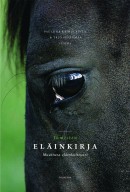 Ihmisten eläinkirja. Muuttuva eläinkulttuuri
Ihmisten eläinkirja. Muuttuva eläinkulttuuri
[The people’s book of animals. Our changing relationship with the animal kingdom]
Toimittaneet [Ed. by]: Pauliina Kainulainen & Yrjö Sepänmaa
Helsinki: Gaudeamus Helsinki University Press. 235 p., ill.
ISBN 978-951-570-786-4
€ 31, paperback
This book adopts a multidisciplinary approach in its examination of the relationship between humans and animals, highlighting historical, ethical and philosophical connections. The authors include humanists, theologians, anthropologists and artists. They address issues such as animal and nature conservation, animal breeding and husbandry, attitudes towards animals in myth and religion, and depictions of animals in Finnish art. Humans’ relationship to animals can hardly be said to have been consistent: in some religions, certain animals were worshipped as gods, whereas others viewed them as symbols of evil. We treat our pets as members of the family, while livestock animals are subjected to more and more cost-effective production methods. The architect Juhani Pallasmaa introduces readers to the master architects of the animal world and their highly refined, diverse architectural solutions, from which people have learnt a great deal.
In the detail?
11 December 2009 | Essays, Non-fiction
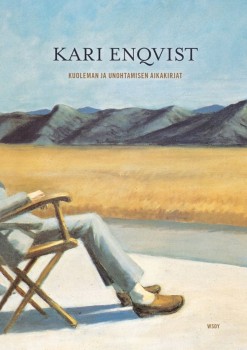 Extracts from Kuoleman ja unohtamisen aikakirjat (‘Chronicles of death and oblivion’, WSOY, 2009)
Extracts from Kuoleman ja unohtamisen aikakirjat (‘Chronicles of death and oblivion’, WSOY, 2009)
What’s the meaning of life? There are those who seek it in religion, while for others that is the last place to look. The scientist Kari Enqvist ponders why some people, including himself, seem physiologically immune to the lure of faith. Perhaps, he suggests, we should look for significance not in the big picture, but in the marvel of the fleeting moment
As a young boy I must have held religious beliefs. However, I cannot pinpoint exactly when they disappeared. At some point I eventually stopped saying my evening prayers, but I am unable to remember why or when this happened. ‘I was born in a time when the majority of young people had lost faith in God, for the same reason their elders had had it – without knowing why,’ writes the Portuguese poet Fernando Pessoa in The Book of Disquiet. More…
Damned nihilists
30 December 2008 | Extracts, Non-fiction
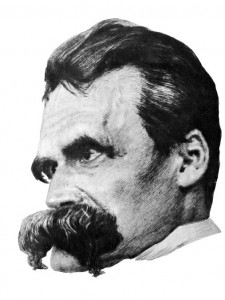
Much misunderstood: father of the superman, Friedrich Nietzsche.
The term nihilism is often bandied about, but often badly misunderstood. In extracts from his new book, Ei voisi vähempää kiinnostaa. Kirjoituksia nihilismistä (‘Couldn’t care less. Writings on nihilism’, Atena, 2008), the social scientist and philosopher Kalle Haatanen discusses the true legacy of Friedrich Nietzsche, nihilism’s high priest
The word nihilist is derived from the Latin: ‘nihil’ means, simply, ‘nothing’. When someone is labelled as nihilist or seen as representing nihilism, this has always been a curse, a mockery or an accusation, whether in philosophy, politics or everyday conversation. More recently, the word has generally been used to refer to people who do not believe in anything – people whose world-view is without principle, without ideals, barren. More…
